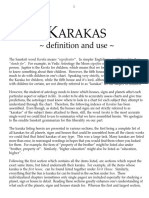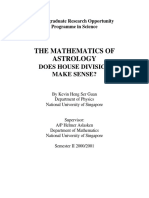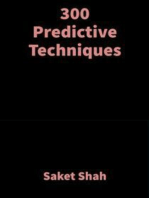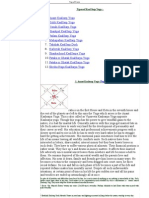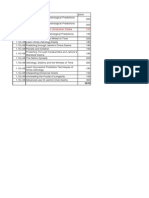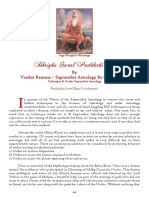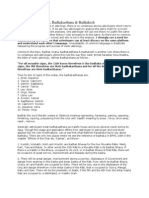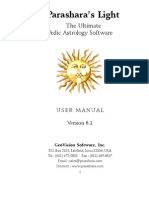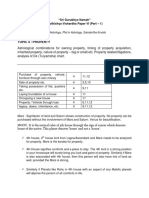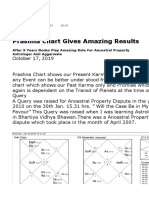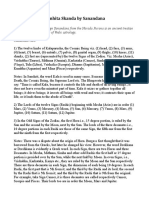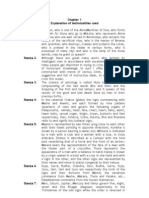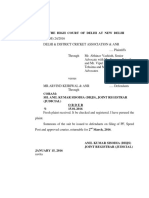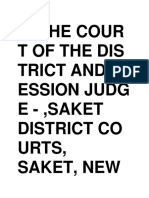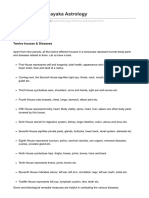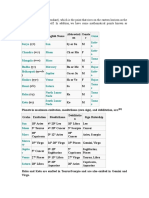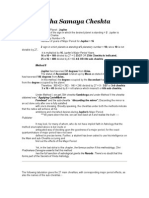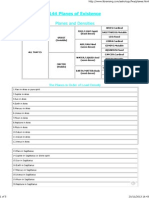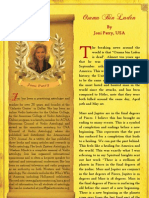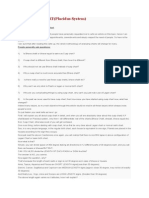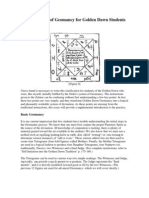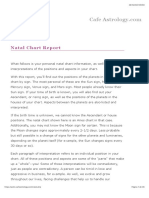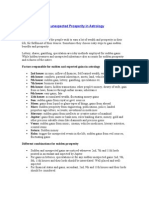0 ratings0% found this document useful (0 votes)
104 viewsChapter 1
Chapter 1
Uploaded by
madhav225This document provides an overview of Varahamihira's classic text Daivajna Vallabha on the branch of astrology known as Prashna or Horary astrology. It discusses the planetary states and their results, the duties of the querist, and how to interpret the houses and their significations to make predictions based on a horary chart. Key points include the 10 planetary states (exalted, debilitated, own sign, etc.), interpreting the houses to judge topics like health, wealth, relationships, and predicting outcomes based on the placement of benefics and malefics.
Copyright:
© All Rights Reserved
Available Formats
Download as DOCX, PDF, TXT or read online from Scribd
Chapter 1
Chapter 1
Uploaded by
madhav2250 ratings0% found this document useful (0 votes)
104 views4 pagesThis document provides an overview of Varahamihira's classic text Daivajna Vallabha on the branch of astrology known as Prashna or Horary astrology. It discusses the planetary states and their results, the duties of the querist, and how to interpret the houses and their significations to make predictions based on a horary chart. Key points include the 10 planetary states (exalted, debilitated, own sign, etc.), interpreting the houses to judge topics like health, wealth, relationships, and predicting outcomes based on the placement of benefics and malefics.
Original Description:
prahna jyotish
Copyright
© © All Rights Reserved
Available Formats
DOCX, PDF, TXT or read online from Scribd
Share this document
Did you find this document useful?
Is this content inappropriate?
This document provides an overview of Varahamihira's classic text Daivajna Vallabha on the branch of astrology known as Prashna or Horary astrology. It discusses the planetary states and their results, the duties of the querist, and how to interpret the houses and their significations to make predictions based on a horary chart. Key points include the 10 planetary states (exalted, debilitated, own sign, etc.), interpreting the houses to judge topics like health, wealth, relationships, and predicting outcomes based on the placement of benefics and malefics.
Copyright:
© All Rights Reserved
Available Formats
Download as DOCX, PDF, TXT or read online from Scribd
Download as docx, pdf, or txt
0 ratings0% found this document useful (0 votes)
104 views4 pagesChapter 1
Chapter 1
Uploaded by
madhav225This document provides an overview of Varahamihira's classic text Daivajna Vallabha on the branch of astrology known as Prashna or Horary astrology. It discusses the planetary states and their results, the duties of the querist, and how to interpret the houses and their significations to make predictions based on a horary chart. Key points include the 10 planetary states (exalted, debilitated, own sign, etc.), interpreting the houses to judge topics like health, wealth, relationships, and predicting outcomes based on the placement of benefics and malefics.
Copyright:
© All Rights Reserved
Available Formats
Download as DOCX, PDF, TXT or read online from Scribd
Download as docx, pdf, or txt
You are on page 1of 4
At a glance
Powered by AI
The text discusses the different planetary states (such as exalted, debilitated, etc.) and how they impact the results of a horary astrology reading. It also outlines the factors considered when evaluating a query, such as the placements of benefic and malefic planets. Finally, it explains which houses correspond to different topics that can be inquired about in a horary chart, such as health, relationships, career, etc.
The text outlines 10 different planetary states: exalted, debilitated, own sign, friendly sign, inimical sign, defeated, setting, approaching debilitation, approaching exaltation, and powerful. It provides examples of each state.
The text says the astrologer considers the planetary states and house placements to determine results. Positive results are indicated if benefics are in angular and trine houses and malefics are elsewhere. The lord of the ascendant or its friend in an angle is also a good sign.
Chapter 1: Uses of Horary Astrology
Chapter 2: Bhava Prasna General Estimate ,questions on any house topics
Daivagyna Vallabha by Varaha Mihira, also known as Sripati, is a great classic on
Prashna or Horary branch of astrology. Varahamihira was the famous astrologer in the
court of The Great king Vikramaditya in the year 57BC. He was also a great astronomer
and the first one to mention in his work Pancha Siddhantika, based on our ancient
Siddhantas, that the ayanamsa, or the shifting of the equinox is 50.32 seconds. He also
authored the famous Brihat Samhita, Laghu Jataka and Yogayatra.
Chapter 1- Beginning of the query
1. Having paid obeisance to Lord Narasimha who is fierce by his form and who is ever
emitting fire from face, who is one without a second, and who is the over-lord of the
entire universe, Sripati (Varahamihir) is writing this work Daivajna Vallabha dealing with
the science of Horary Astrology.
2. The astrologer, who proclaims good and bad results after a deep consideration of the
ten Avasthas (states) of planets and the results arising from the different houses, never
goes wrong.
3-6. Planetary States: Diptha (shining), Dina (miserable), Swastha (comfortable),
Muditha (happy), Suptha (sleeping), Prapiditha (troubled), Mushita (robbed),
Parihiyamanavirya (with power declining), Pravriddhavirya (with increased vigour), and
Adhivirya (endowed with extreme power) are the ten planetary states:
1. When the planet is placed in its exaltation sign is called Diptha.
2. When it is in its debilitation sign, it is called Dina.
3. In its own sign, the planet is termed Swastha.
4. In a friendly sign, it is called Mudhitha.
5. In an inimical sign, it is called Suptha.
6. When it is defeated in planetary war, it is termed Nipiditha.
7. While it is in heliocal setting, it is called Mushita.
8. While it is approaching its debilitation sign it is named Parihiyamanavirya.
9. While it is approaching its exaltation sign it is termed Pravriddhavirya.
10. The planet placed in the vargas of benefics after its rising, is called Adhikavirya.
7-8. Results of Planetary states Diptha, etc. : When a planet is in Diptha state full
acquisition of the desired objects is to be foretold. If it be in the Dina state it indicates
impending poverty.
If the planet be in the Swastha state, the object will be accomplished and there will be
acquisition of wealth, fame and happiness in addition. If it be in the Mudhitha state,
there will be all-round happiness, and the accomplishment of desired objects.
If the planet be in the Prasuptha state, there will be danger and accidents etc. If it is in
the Prapiditha state, there will be troubles through enemies. If it be in the Mushitha
state, there will be loss of wealth. If the planet be in Pravriddhavirya state there will be
aquisition of elephants, horses, gold and lands i.e. wealth. If it be Adhivirya state, it
bestows the three kinds of powers HINDI (the powers of energy, good-counsel and
majesty) and extensive properties.
9-10. The duty of the querist : The querist should worship in his house, the planets and
the rasi chakra (zodiacal diagram) and the stars with flowers, fruits, gold and precious
stones. He should be full of devotion towards God and the planets and should offer
homage to deities and preceptors. Carrying flowers, gems, fruits and sacred vice he
should go to the astrologer and pay respects to him and with great reverence, facing an
auspicious direction (east, north, etc.) he should put the query to him with a pure mind
and that query should be put once only.
11. The astrologer should understand the good and bad results by considering carefully
the syllables of the query as also the omens obtaining around and then proclaim the
prediction for that time.
12. If the query is put in a place having charming trees laden with flowers, which is
rendered pure by cow-dung, flowers and water and a place pleasing to the eyes, surely
men will accomplish their desired objects without any doubt.
13. If the place is pleasing to the eyes and the mind, if there be sight of auspicious
objects at the time of the query, good results in response to the query are bound to
happen in near future thus say the acharyas Maya and Maniththa.
Chapter 2 - Good and Bad Results
1. The five auspicious omens produce the achievement of desired objects. And the five
inauspicious omens lead to undesirable result. If both auspicious and inauspicious
omens are seen, the result has to be told by judgement of the strength of the omens.
Results can be proclaimed on the basis of the strength of even four or less number of
omens.
2. The house which is associated or aspected by its lord flourishes and yields its results
fully. If the places 2, 4, 7, 10 and 12 counted from a house are occupied by benefics,
the house flourishes. If the said places are occupied by malefics, it decays.
3. The different synonyms of the names of the twelve houses as also the names
acquired by them through their functions are being told according to the opinion of the
ancient sages. From these the results of the querries have to be judged.
4. Health, honour, qualities, nature, conduct, age, state, caste, purity, happiness,
misery, expression, form, colour, wife of nephew - all these are to be judged from the
first house.
5. Manikya (ruby), pearl, gem, metallic ores, articles, dress, gold, house, silver, grains,
transactions, buying and selling - all these are to be judged from the 2nd house in
general.
6. Daughter-in-law, younger brother, welfare, intellect, gains, servants, servant maids,
valorous actions and things relating to brother - all these are to be judged from the third
house.
7-8. House, treasure, entry into caves and other holes, great medicines, cultivated
lands, fields, orchards, friends, water, ceremonies in connection with ancestors, coming
and going, village, happiness, demotions, loss of post, gains, entry into a house,
increase, parents, deeds relating to one's native country and gains therefrom - all these
are to be judged from the fourth house.
9. Deeds of many kinds, humility, execution, planning, learning, Niti, intellect, hymns,
chanting, compromise, pregnancy, children, intellect and happiness derived through
children and wealth are matters to be judged from the fifth house.
10. Ill health, bad state, enemies, servants, cruel deeds, heavy actions, witchcraft
applied by enemies with an intention of killing enemies, doubts, wars, uncle, buffaloes,
diseases, etc. are to be considered from the sixth house.
11. Buying, health, trade, debates, lust, servants, wife, women, thefts, returning from
travel, sister's son (nephew), coming and going - all these are denoted by the seventh
house.
12. Longevity and enmity, death, ruling powers, strife, quarrels, cleft, quarrels among
relatives, hatred, places difficult to approach, fort, destruction of wife and enemies,
crossing of rivers etc. are to be seen from the eighth house.
13. Sacred study of books, intention in vedic temples, travels to holy places, love,
coronation of kings, preceptor, meritorious deeds, reservoirs of water (wells, ponds,
lakes etc.) brother-in-laws, brothers of husbands and wives and governmental favour
are matters to be seen from the ninth house.
14. Clues from the sky, rains, actions of one's father and his place, respect, merit,
country, power authority, cows, fall from position, (displacements, demotions, etc.) are
judged from the tenth house.
15. Advancement of one's actions, success in enterprises, gains from trade, elephants,
houses, dress, transport, vehicles, bedding, loss of gold and wealth, gains of damsels
and elephants, father-in-law are judged from the eleventh house.
16. Renunciation, enjoyments, sacrifices, marriage, donation, cultivation, expenditure,
injury, maternal uncle, mother's sister, wife of maternal uncle, wars, defeat in a war are
matters to be seen from the twelfth house.
17. The objects that are to be judged from the different houses as proclaimed by the
great Acharyas, Yavana, etc. become the functional names attributed to the house.
From the corresponding house, the objects should be judged, in a query.
18. While answering queries, whatever object is under consideration, the house
representing the same should be treated as the ascendant and the results declared.
19. From the functions attributed to the different houses, the ascendant has to be
determined as told above. Past has to be judged from the 12th house and future from
the 2nd house.
20. Combinations for success of the object of the query: If the ascendant falls in a
Shirshodaya sign or in the sign of a benefic planet, the result of the query will be
auspicious. Under opposite circumstances, results will be just the reverse. If the
circumstances are mixed, results will also found to be of mixed nature.
21. All the desired objects are achieved if the benefics occupy the quadrants (1, 4, 7 &
10) and the trikona houses (5 and 9) and at the same time malefics are situated in the
house 3, 6 and 11 and they do not occupy the angular house (1, 4, 7 & 10) and the 8th
house.
22. If the lord of an angular house is placed in the ascendant or the friend of the lord of
the ascendant be placed in an angular house and malefic planets do not occupy
Kendras, 8th house and the 12th house (1, 4, 7, 10, 8 and 12), the result of the query
will be auspicious.
23. In the ascendant falls in a human sign, and be aspected by benefic planets or if
benefics occupy 1st, 4th, 7th, and 10th houses, and malefics occupy 3rd, 6th and 11th
houses, good results, gains and financial prosperity have to be foretold.
24. The signs Gemini, Virgo, Tula, Aquarius are termed human signs. If benefics are
placed in these signs, results will be auspicious. Malefics in the 11th and 12th houses
will not yield good results. Weak Moon in the ascendant is not good. But in the 10th
house it is good.
You might also like
- Jyotish - R K Aneja - Your Life Partner A Gift or A CurseDocument198 pagesJyotish - R K Aneja - Your Life Partner A Gift or A Cursesanagavarapusubrahma100% (3)
- Jyotish - Das Goravani - Karakas - From SoftwareDocument114 pagesJyotish - Das Goravani - Karakas - From Softwaremadhav225100% (10)
- The Mathematics of Astrology PDFDocument34 pagesThe Mathematics of Astrology PDFJ. Perry Stonne100% (1)
- Legal Notice. For ContractorDocument7 pagesLegal Notice. For Contractormadhav225100% (2)
- Astrology For Layman: The most comprehensible book to learn astrologyFrom EverandAstrology For Layman: The most comprehensible book to learn astrologyRating: 1 out of 5 stars1/5 (1)
- Importance of Chanting Vishnu SahasranamamDocument2 pagesImportance of Chanting Vishnu SahasranamamSunil RupaniNo ratings yet
- Explains ParyayasDocument3 pagesExplains ParyayasRohit SahuNo ratings yet
- Kaal Sarp Yoga TypeDocument6 pagesKaal Sarp Yoga TypemanojNo ratings yet
- Neeraj Sobti-VarshaphalaDocument5 pagesNeeraj Sobti-VarshaphalaAvanindra MisraNo ratings yet
- Effects of Kala Chakra Dasha of The Rāśis in Lagna and Other HousesDocument3 pagesEffects of Kala Chakra Dasha of The Rāśis in Lagna and Other HousesBobbyDoankNo ratings yet
- What Is To Be Seen From Which HouseDocument2 pagesWhat Is To Be Seen From Which Housemahadp08No ratings yet
- BhavasDocument7 pagesBhavash2bNo ratings yet
- Sanskrit - Shri Siddhantha Shikhamani - Ekam Dharshika KavyamDocument38 pagesSanskrit - Shri Siddhantha Shikhamani - Ekam Dharshika KavyamVeeresh BTNo ratings yet
- Rahukalanal Chakra EditionDocument2 pagesRahukalanal Chakra EditionAnonymous jGdHMEODVmNo ratings yet
- Horasara of Prithuyasas Son of VarahamihiraDocument117 pagesHorasara of Prithuyasas Son of Varahamihirapramodc220% (1)
- 3rd Chapter of Prasha MargaDocument29 pages3rd Chapter of Prasha MargaTushar Kumar BhowmikNo ratings yet
- Definition of A GrahaDocument7 pagesDefinition of A GrahaSuperlativeIndiaNo ratings yet
- RAO, ASTROLOGY, Jyotish, K N Rao, Vedic AstrologyDocument1 pageRAO, ASTROLOGY, Jyotish, K N Rao, Vedic AstrologyAmit Chopra100% (2)
- Bhrighu Saral Paddathi - 8: by Venkat Ramana - Saptarishis Astrology Re-Search TeamDocument9 pagesBhrighu Saral Paddathi - 8: by Venkat Ramana - Saptarishis Astrology Re-Search TeamSiaNo ratings yet
- Garga HoraDocument98 pagesGarga Horahaixia420No ratings yet
- AshtakaVarga Audio LessonDocument4 pagesAshtakaVarga Audio Lessonnabin shresthaNo ratings yet
- Jaimini Astrology - Chara DashaDocument5 pagesJaimini Astrology - Chara DashaVijay DuaNo ratings yet
- Amazing Journey of Bill Gates - Sep 10Document4 pagesAmazing Journey of Bill Gates - Sep 10Monica D. SaxenaNo ratings yet
- Saptarishi Nadi Aries Chart 16Document18 pagesSaptarishi Nadi Aries Chart 16Олег КузнецовNo ratings yet
- Hora SaraDocument17 pagesHora SaraSaurabh Sharma100% (1)
- Bhava Phala Praveshik 11Document10 pagesBhava Phala Praveshik 11Satyanneshi ERNo ratings yet
- Horāsāra Of: P Chapter One: Division of The Zodiac SignsDocument66 pagesHorāsāra Of: P Chapter One: Division of The Zodiac Signsyuva razNo ratings yet
- CKN-Deva Keralam - B3 Shl-1998 OnwardDocument3 pagesCKN-Deva Keralam - B3 Shl-1998 OnwardHemant BhattNo ratings yet
- Alternate or Special LagnasDocument6 pagesAlternate or Special LagnasGanapathi Nayak KNo ratings yet
- What's More Powerful in Vedic Astrology, Mahadasha or The Individual Transit of The PlanetsDocument5 pagesWhat's More Powerful in Vedic Astrology, Mahadasha or The Individual Transit of The Planetsavinash_usa2003No ratings yet
- Hora Sara: Chapter-12. The Effects of Budha DashaDocument26 pagesHora Sara: Chapter-12. The Effects of Budha DasharaokvkpNo ratings yet
- Obstructive Planets - Badhak GrahaDocument2 pagesObstructive Planets - Badhak Grahacatchdgreen100% (1)
- Palmistry: Wednesday, 24 October 2018Document10 pagesPalmistry: Wednesday, 24 October 2018aditya1711No ratings yet
- Gulik and MaandiDocument2 pagesGulik and MaandiAjay Kumar JainNo ratings yet
- Mundane and Shed Bala Dec 2023Document7 pagesMundane and Shed Bala Dec 2023MC JOSHINo ratings yet
- kARTIKEYA PRAGYA VIVARDHANAM PDFDocument5 pageskARTIKEYA PRAGYA VIVARDHANAM PDFSharmila JainNo ratings yet
- Laghu Parashari S.S. SareenDocument197 pagesLaghu Parashari S.S. Sareenhoddath hNo ratings yet
- Online Papers - June 2010 BatchDocument105 pagesOnline Papers - June 2010 BatchBhavana HatwarNo ratings yet
- Twelve HouseDocument2 pagesTwelve HouseM. M. Rohana WasanthaNo ratings yet
- K N Rao - Planets and Sisters and BrothersDocument215 pagesK N Rao - Planets and Sisters and Brothershoddath hNo ratings yet
- Imp Basic & Cast Astrology - 0001Document75 pagesImp Basic & Cast Astrology - 0001avneeshNo ratings yet
- Marc Boney - Predicting Settlement Abroad (2021)Document61 pagesMarc Boney - Predicting Settlement Abroad (2021)PNo ratings yet
- Bhaskra Bhava DeepikaDocument49 pagesBhaskra Bhava Deepikavishveshraval565No ratings yet
- PL61Document213 pagesPL61SHIVEMISHRANo ratings yet
- Lotus Method of PredictionsDocument15 pagesLotus Method of PredictionsdfronssNo ratings yet
- Graha YuddhaDocument10 pagesGraha YuddhaHeather WilliamsNo ratings yet
- Va Kri Planets PDFDocument70 pagesVa Kri Planets PDFAnkit PareekNo ratings yet
- B P Lama Dashas FundaDocument101 pagesB P Lama Dashas FundaSundar RamanathanNo ratings yet
- New Microsoft Office Word DocumentDocument7 pagesNew Microsoft Office Word DocumentdakshinastrologerNo ratings yet
- VarshaphalDocument9 pagesVarshaphalAshishh ChoprraNo ratings yet
- Jaimini Astrology - Brahma, Maheshwara and RudraDocument2 pagesJaimini Astrology - Brahma, Maheshwara and RudraserayNo ratings yet
- Iyer WorksheetDocument15 pagesIyer WorksheetJatinder SandhuNo ratings yet
- Varga AstakaDocument13 pagesVarga AstakaDvs RameshNo ratings yet
- Argala and 10th HouseDocument4 pagesArgala and 10th HouseKrishna CHNo ratings yet
- ICAS - Advanced - Topic 4 - PropertyDocument10 pagesICAS - Advanced - Topic 4 - PropertysarvesvarabvksNo ratings yet
- Prashna Chart Gives Amazing ResultsDocument20 pagesPrashna Chart Gives Amazing ResultsmichaNo ratings yet
- Yoga Karakas in Vedic AstrologyDocument1 pageYoga Karakas in Vedic Astrologya1n2u3s4h5a6No ratings yet
- Samhita SkandaDocument20 pagesSamhita SkandaanupNo ratings yet
- Explanation of Technicalities Used Stanza 1Document45 pagesExplanation of Technicalities Used Stanza 1Begwani Rishabh100% (1)
- Age of VarahamihiraDocument28 pagesAge of VarahamihiraSampathKumarGodavarthiNo ratings yet
- Bhanu Swami - Explanations of The HousesDocument2 pagesBhanu Swami - Explanations of The Housesmadhav225No ratings yet
- 5 Philanthropy ScienceandArtofPersuasionFINAL PDFDocument95 pages5 Philanthropy ScienceandArtofPersuasionFINAL PDFmadhav225No ratings yet
- Before The Hon'Ble High Court of Delhi at New DelhiDocument8 pagesBefore The Hon'Ble High Court of Delhi at New Delhimadhav225No ratings yet
- Supplementary List For Today in Continuation of The Advance List Already Circulated. The Website of Delhi High Court IsDocument314 pagesSupplementary List For Today in Continuation of The Advance List Already Circulated. The Website of Delhi High Court Ismadhav225100% (1)
- Citizen - Charter - January - 2017 (District Court Info) PDFDocument130 pagesCitizen - Charter - January - 2017 (District Court Info) PDFmadhav225No ratings yet
- Haidar Ali vs. Union of India & OrsDocument2 pagesHaidar Ali vs. Union of India & Orsmadhav225No ratings yet
- Signature Not VerifiedDocument3 pagesSignature Not Verifiedmadhav225No ratings yet
- In The High Court of Delhi at New Delhi: TH THDocument2 pagesIn The High Court of Delhi at New Delhi: TH THmadhav225No ratings yet
- In The High Court of Delhi at New DelhiDocument1 pageIn The High Court of Delhi at New Delhimadhav225No ratings yet
- Order Dated 03.02.17 PDFDocument3 pagesOrder Dated 03.02.17 PDFmadhav225No ratings yet
- In The High Court of Delhi at New DelhiDocument2 pagesIn The High Court of Delhi at New Delhimadhav225No ratings yet
- Order Dated 03.02.17 PDFDocument3 pagesOrder Dated 03.02.17 PDFmadhav225No ratings yet
- In The High Court of Delhi at New DelhiDocument1 pageIn The High Court of Delhi at New Delhimadhav225No ratings yet
- In The High Court of Delhi at New DelhiDocument1 pageIn The High Court of Delhi at New Delhimadhav225No ratings yet
- In The High Court of Delhi at New DelhiDocument3 pagesIn The High Court of Delhi at New Delhimadhav225No ratings yet
- In The Cour Tofthedis Trict and S Ession Judg E - , Saket District Co Urts, Saket, NewDocument13 pagesIn The Cour Tofthedis Trict and S Ession Judg E - , Saket District Co Urts, Saket, Newmadhav225No ratings yet
- Palmistry, or Chiromancy (Also Spelled Cheiromancy From Greek KheirDocument1 pagePalmistry, or Chiromancy (Also Spelled Cheiromancy From Greek Kheirmadhav225No ratings yet
- Zodiac Divisions As Per KP AstrologyDocument1 pageZodiac Divisions As Per KP Astrologymadhav225No ratings yet
- Palmistry, or Chiromancy (Also Spelled Cheiromancy From Greek KheirDocument1 pagePalmistry, or Chiromancy (Also Spelled Cheiromancy From Greek Kheirmadhav225No ratings yet
- 154 Joginder Sharma ComplaintDocument9 pages154 Joginder Sharma Complaintmadhav225No ratings yet
- Get-Msoluser - Select-Object Userprincipalname, Blockcredential, Isterminated - Export-Csv C:/Licensedusers - CSVDocument1 pageGet-Msoluser - Select-Object Userprincipalname, Blockcredential, Isterminated - Export-Csv C:/Licensedusers - CSVmadhav225No ratings yet
- Online Application - High Court of Delhi 2017Document4 pagesOnline Application - High Court of Delhi 2017madhav225No ratings yet
- More On Shrivinayaka AstrologyDocument11 pagesMore On Shrivinayaka AstrologysubramanyaNo ratings yet
- Lagna (Ascendant)Document31 pagesLagna (Ascendant)shunmugathason100% (2)
- Jyotish - An Introduction To Jaimini System - Shalini Dhasmana PDFDocument69 pagesJyotish - An Introduction To Jaimini System - Shalini Dhasmana PDFSunil Sharma67% (3)
- Bill GatesDocument22 pagesBill GatesRocker byNo ratings yet
- VedicReport11 25 202310 15 49PMDocument55 pagesVedicReport11 25 202310 15 49PMUditKotechaNo ratings yet
- VedicReport10 3 202211 19 10PMDocument55 pagesVedicReport10 3 202211 19 10PMsandeepkd143No ratings yet
- Hindi PDF NewDocument55 pagesHindi PDF NewpsbhimarajuNo ratings yet
- Sevvai Dosham or Kuja DoshamDocument5 pagesSevvai Dosham or Kuja DoshamChandrasekaranNo ratings yet
- NBRY - Cancellation of DebilitationDocument2 pagesNBRY - Cancellation of Debilitationybbvvprasada raoNo ratings yet
- Graha Samaya CheshtaDocument10 pagesGraha Samaya Cheshtapaparock34No ratings yet
- Combined1 PDFDocument85 pagesCombined1 PDFgannwong100% (1)
- VedicReport5 14 202312 33 45PMDocument55 pagesVedicReport5 14 202312 33 45PMranahimani1310No ratings yet
- ParallelsDocument10 pagesParallelsfarzana25No ratings yet
- Pluto Ascendant Aspect: Becoming A Different PersonDocument3 pagesPluto Ascendant Aspect: Becoming A Different PersonRamanasarma100% (1)
- Osama Bin Laden by Joni Patry ColorDocument6 pagesOsama Bin Laden by Joni Patry ColorSaptarishisAstrologyNo ratings yet
- The 12 Houses of The Horoscope WheelDocument1 pageThe 12 Houses of The Horoscope WheelLynne LuxfordNo ratings yet
- Natal Chart ReportDocument1 pageNatal Chart ReportGabriela AlvarezNo ratings yet
- Ancient Astrology: When Does Lagna Lord Give Bad Results?Document13 pagesAncient Astrology: When Does Lagna Lord Give Bad Results?debenNo ratings yet
- CUSP or KP CHARTDocument4 pagesCUSP or KP CHARTMayank DixitNo ratings yet
- A Clarification of Geomancy For Golden Dawn StudentsDocument10 pagesA Clarification of Geomancy For Golden Dawn Studentsmarc_us2567% (3)
- 2018 Kanakkumar+Bosmia Easy+Way+To+Learn+KP+Theory+of+short+predictionDocument84 pages2018 Kanakkumar+Bosmia Easy+Way+To+Learn+KP+Theory+of+short+predictionvedaalinn100% (1)
- Birth Date: 12 Jan 2006 Birth Place: Port LouisDocument7 pagesBirth Date: 12 Jan 2006 Birth Place: Port Louisavish_023No ratings yet
- 11 Aquarius Ascendant Horoscope Birth Chart AstrologyDocument3 pages11 Aquarius Ascendant Horoscope Birth Chart AstrologyRahulshah1984No ratings yet
- Natal Chart ReportDocument36 pagesNatal Chart ReportTaísa RodriguesNo ratings yet
- Sophia Brown and Luke - Synastry ReportDocument43 pagesSophia Brown and Luke - Synastry ReportSophia BrownNo ratings yet
- Astrological YogasDocument304 pagesAstrological Yogasssoni_2194% (17)
- Kundali MatchingDocument2 pagesKundali MatchingPriyatharisini GunasilanNo ratings yet
- KAS Visual One - KAS AstrologyDocument5 pagesKAS Visual One - KAS AstrologyGauriGanNo ratings yet

